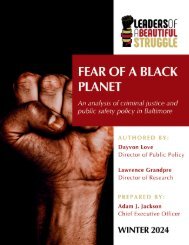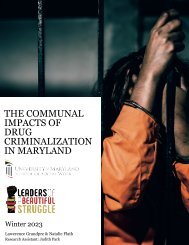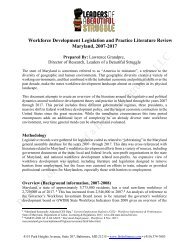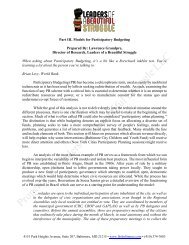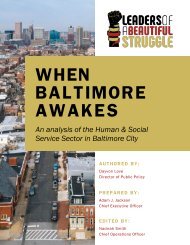Drug Decriminalization in Maryland Through an African Centered Research Paradigm- Analysis and Recommendations
This document offers guidance for theorizing questions related to a proposed research project purposed to advance drug decriminalization in Maryland.
This document offers guidance for theorizing questions related to a proposed research project purposed to advance drug decriminalization in Maryland.
- No tags were found...
Create successful ePaper yourself
Turn your PDF publications into a flip-book with our unique Google optimized e-Paper software.
mariju<strong>an</strong>a was grown <strong>an</strong>d used openly. Others ma<strong>in</strong>ta<strong>in</strong>ed that with Portugal’s open<strong>in</strong>g<br />
after 1974, drug use was simply part of a large “package” of issues that it beg<strong>an</strong> to share<br />
with other Western societies as the country, pursu<strong>in</strong>g more multilateral cooperation with<br />
other countries, became exposed to new ideas, trends, <strong>an</strong>d fashions.<br />
After a half century of isolation, the Portuguese were ill-prepared to confront the wave<br />
of ch<strong>an</strong>ges that came with greater openness <strong>in</strong> the late 1970s. They possessed no common<br />
knowledge about drugs, especially the dist<strong>in</strong>ction between hard <strong>an</strong>d soft drugs, what<br />
problems different drugs carried, what health risks they presented to <strong>in</strong>dividuals, or what<br />
k<strong>in</strong>d of social problems they caused.<br />
In the early 1980s, the most commonly used drugs <strong>in</strong> Portugal were hashish <strong>an</strong>d<br />
mariju<strong>an</strong>a, but hero<strong>in</strong> had already appeared by the late 1970s. Hero<strong>in</strong> smuggled from<br />
Pakist<strong>an</strong> <strong>an</strong>d India through the former colony of Mozambique by Portuguese of Pakist<strong>an</strong>i<br />
orig<strong>in</strong> was sold on Portuguese streets <strong>in</strong> the late 1970s <strong>an</strong>d early 1980s. Then, when two<br />
large g<strong>an</strong>gs smuggl<strong>in</strong>g hero<strong>in</strong> through Mozambique were broken up, hero<strong>in</strong> started<br />
flow<strong>in</strong>g from the Netherl<strong>an</strong>ds. Because hero<strong>in</strong> smuggl<strong>in</strong>g <strong>in</strong> Portugal consisted of so m<strong>an</strong>y<br />
small groups <strong>an</strong>d <strong>in</strong>dividual smugglers, the authorities found it impossible to stop. Hero<strong>in</strong><br />
use was also ch<strong>an</strong>g<strong>in</strong>g at this time, as consumers started to smoke as well as <strong>in</strong>ject the<br />
drug.<br />
In the late 1980s, <strong>an</strong>d especially <strong>in</strong> the early 1990s, drug consumption <strong>in</strong> Portugal<br />
became a subject of social concern. M<strong>an</strong>y people <strong>in</strong> Portuguese society concluded that the<br />
country had a serious drug problem <strong>an</strong>d high drug consumption. At the time, this<br />
conviction was not based on <strong>an</strong>y research on consumption, but simply general impressions<br />
<strong>an</strong>d <strong>an</strong>ecdotal evidence. A likely contribut<strong>in</strong>g factor to these impressions was that drug<br />
consumption <strong>in</strong> some districts of Lisbon <strong>an</strong>d other bigger cities had become more open <strong>an</strong>d<br />
visible. A EuroBarometer survey conducted <strong>in</strong> 1997 showed that the Portuguese perceived<br />
drug-related issues as the country’s ma<strong>in</strong> social problem. Four years later <strong>in</strong> 2001,4 when<br />
the new law decrim<strong>in</strong>aliz<strong>in</strong>g drug possession <strong>an</strong>d use was implemented, drugs occupied<br />
third place on the list of issues that gave rise to social concern among the Portuguese.<br />
(ibid).<br />
Domosławski <strong>in</strong>clusion of Pakist<strong>an</strong>i <strong>an</strong>d Mozambique be<strong>in</strong>g seen as the progenitors of a hero<strong>in</strong>e<br />
epidemic <strong>in</strong> Portugal should be read with<strong>in</strong> the <strong>an</strong>alysis given by Netherl<strong>an</strong>d <strong>an</strong>d Hass<strong>an</strong>. In this<br />
context, Portugal’s underst<strong>an</strong>d<strong>in</strong>g of addiction is deeply l<strong>in</strong>ked to narrative of protect<strong>in</strong>g whiteness<br />
from devi<strong>an</strong>t otherness. It c<strong>an</strong> also be read with<strong>in</strong> the context of Karam’s <strong>an</strong>alysis, with c<strong>an</strong>nabis<br />
<strong>an</strong>d LSD seen as “m<strong>in</strong>d exp<strong>an</strong>d<strong>in</strong>g” “soft” drugs which c<strong>an</strong> coexist with <strong>an</strong>d maybe even facilitate<br />
the function<strong>in</strong>g of whtie subjected rationally engag<strong>in</strong>g with the world <strong>an</strong>d affirm<strong>in</strong>g archetypal<br />
white characteristics of self control, while hero<strong>in</strong>e is seen as a drug which threats whiteness <strong>an</strong>d<br />
creat<strong>in</strong>g idleness <strong>an</strong>d robb<strong>in</strong>g its “victims” of their rational facilities (i.e. racially “blacken<strong>in</strong>g”<br />
them). F<strong>in</strong>ally, Portugal c<strong>an</strong> be read with<strong>in</strong> Alex<strong>an</strong>der’s <strong>an</strong>alysis of “psychosocial” <strong>in</strong>tegration <strong>an</strong>d<br />
socials structures as be<strong>in</strong>g the superstructure which creates the context for addiction. The tr<strong>an</strong>sition<br />
4151 Park Heights Avenue, Suite 207, Baltimore, MD 21215 • www.lbsbaltimore.com • (410) 374-7683




